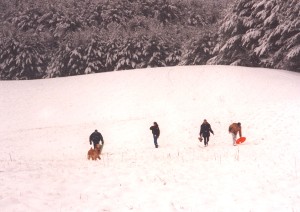UPDATE: Here is a pretty good discussion of the economy right now.
I have previously described the COVID 19 virus, which is also referred to as Wuhan virus, to the annoyance of the China friendly US Media. The consequences for the US economy have been severe. The most affected states, New York, California, Illinois and Washington, have virtually shut down their population. Arizona is less affected with 78 positives cases as of today, and no deaths.
Italy and China have had the most deaths. There are a number of factors that probably affect these cases. China is notorious for air pollution and smoking, especially men smoking. There has been a dearth, so far, of listing comorbidities but age has been a major one.
One study lists mortality at age 80+ at 15%. The overall death rate in China was listed at 2.3%, which may reflect smoking and air pollution. South Korea, which has had a big spike as testing progressed much more rapidly than in the US, has a case mortality of less than 1%
South Korea has the dubious distinction of suffering the second-highest number of Covid-19 infections after China – but can also boast the lowest death ratio among countries with significant numbers of cases.
According to the WHO on March 6, the crude mortality ratio for Covid-19 – that is, the number of reported deaths divided by the number of reported cases – is between 3-4%. In Korea, as of March 9, that figure was a mere 0.7%.
AS US testing finally gets going, after the FDA and CDC delayed matters for a month, we will see a big spike in number of cases but, I am convinced, a big drop in mortality rate.
Telephone consulting services, drive-through test centers and thermal cameras – which, set up in buildings and public places to detect fever, swiftly came online. South Korea has undertaken approximately 190,000 tests thus far, according to KCDC Deputy Director General Kwon Jun-wook, and has the capacity to undertake 20,000 per day. Turnaround times are six-24 hours.
Tests are highly affordable. “The test kit is about $130, and about half is covered by insurance the other half by individual,” Kwon said. Those who test positive get the test free, “So there is no reason for suspected cases to hide their symptoms,” he said.
We should be doing the same.
At the same time, we are risking severe economic damage to the country by shutting down business activity. I believe that much of the drastic steps taken by governors, especially in New York and California, is unnecessary. High density cities like New York City and Chicago may have more reason to fear spread of the virus. Most of the country, a source of annoyance to left wing politicians, is of low population density.
Another failure of the US response is the absence of masks, which may play a role in limiting transmission in densely populated areas, as in Asia cities. There are reports that China has controlled most of the manufacturing and resists export.
China made half the world’s masks before the coronavirus emerged there, and it has expanded production nearly 12-fold since then. But it has claimed mask factory output for itself. Purchases and donations also brought China a big chunk of the world’s supply from elsewhere.
Now, worries about mask supplies are rising. As the virus’s global spread escalates, governments around the world are restricting exports of protective gear, which experts say could worsen the pandemic.
Also, there is now evidence that treatment of the infected may not require new drugs but be available with known drugs like chloroquine and its analog, hydroxychloroquine
Israeli pharmaceutical company Teva is donating millions of doses of a malaria drug that is believed to be effective in fighting the symptoms of the coronavirus.
The Jerusalem Post reports that the six million doses of hydroxychloroquine sulfate will be shipped to US hospitals started March 31. By the end of next month, 10 million will be shipped.
It is uncertain how effective the malaria treatment will be against coronavirus, but research is currently ongoing.
In fact, there is good evidence that it is effective.
The in vitro antiviral activity of chloroquine has been identified since the late 1960’s (Inglot, 1969; Miller and Lenard, 1981; Shimizu et al., 1972) and the growth of many different viruses can be inhibited in cell culture by both chloroquine and hydroxychloroquine, including the SARS coronavirus (Keyaerts et al., 2004). Some evidence for activity in mice has been found for a variety of viruses, including human coronavirus OC43 (Keyaerts et al., 2009), enterovirus EV-A71 (Tan et al., 2018), Zika virus (Li et al., 2017) and influenza A H5N1 (Yan et al., 2013). However, chloroquine did not prevent influenza infection in a randomized, double-blind, placebo-controlled clinical trial (Paton et al., 2011), and had no effect on dengue-infecteds patient in a randomized controlled trial in Vietnam.
I had speculated that they might be effective in Influenza but this appears to not be the case.
Clinical trials have already shown effectiveness.
According to Sun, patients treated with chloroquine demonstrated a better drop in fever, improvement of lung CT images, and required a shorter time to recover compared to parallel groups.
The percentage of patients with negative viral nucleic acid tests was also higher with the anti-malarial drug.
Chloroquine has so far showed no obvious serious adverse reactions in the more than 100 participants in the trials.
The first case report using remdesivir was dramatic.
The drug is now in clinical trial but the chloroquine evidence reduces the urgency of the study.
What do we do now ?
My wife and I are at high risk but it is easy for us to self isolate. The mortality rate for those under age 50 is about equal to that of influenza. For those between 50 and 70, only those with pre-existing morbidities have a serious risk.
It is time to reopen the economy certainly by next week. The damage done by unemployment and bankruptcy will far exceed that of the disease.









